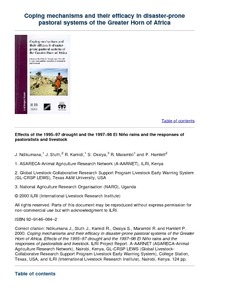Dry-season water allocation and management in the Chao Phraya Delta
Land reform and the development of commercial agriculture in Vietnam: policy and issues
Over the last decade, following the doi moi reforms, the Vietnamese government has formally recognised the household as the basic unit of production and allocated land use rights to households. Under the 1993 Land Law these rights can be transferred, exchanged, leased, inherited, and mortgaged. A land market is emerging in Vietnam but is still constrained for various reasons. Additionally, lack of flexibility of land use is an issue.
Weed infestation and soil erosion resulting from the breakdown of the slash and burn cultivation system
No-Tillage Farming for Sustainable Land Management: Lessons from the 2000 Brazil Study Tour
In November 2000, the World Bank (WB) and the Brazilian Federation for Direct Planting into Crop Residue (FEBRAPDP) organized the third Study Tour on “Producer-Led Rural Organizations for Sustainable Land Management” (PRO-SLM), with particular emphasis on notillage systems (NT).1 The Study Tour followed a 10-day itinerary of over 1,000 km through Southern Brazil, covering Paraná and Santa Catarina States, two states which received WB support through land and micro-watershed management projects.
Réforme agraire: Colonisation et coopératives agricoles 2000/1
Issues relating to land and land reform have been moving up the agenda of rural poverty and food security in recent years with the increasing acceptance that the prerequisites for broad-based and equitable development include the essential need for people to have access to land and other natural resources. Access needs to be on an equitable basis allowing the poor and the disadvantaged, including women, to secure the assets needed for them and their families to generate sustainable livelihoods.
The Economics of Conservation Agriculture
Conservation agriculture
The purpose of this publication is to show how conservation agriculture can increase crop production while reducing erosion and reversing soil fertility decline, improving rural livelihoods and restoring the environment in developing countries. Soil organic matter and biological activity in the rooting zone, stimulated by continual additions of fresh organic material (crop residues and cover crops) are the basis of conservation agriculture, as described in the first chapter.
Land Tenure, Title Deeds, and Farm Productivity in the Southern Province of Zambia: Preliminary Research Findings (Outline)
Addresses the research question, do different land tenure conditions affect farming systems, organisation and performance among Zambian small farmers, and if so, how? Discusses the widespread demand for title, even on customary lands, and concludes that this is a defensive measure, based on a desire for secure possession and for bequeathment and the protection of fixed investments.
Loi sur les améliorations structurelles.
La présente loi met en exécution, entre autres, la loi du 20 juin 2001 sur le développement rural et l’ordonnance 7 décembre 1998 sur les améliorations structurelles dans l'agriculture (ordonnance sur les améliorations structurelles) (OAS)5).






